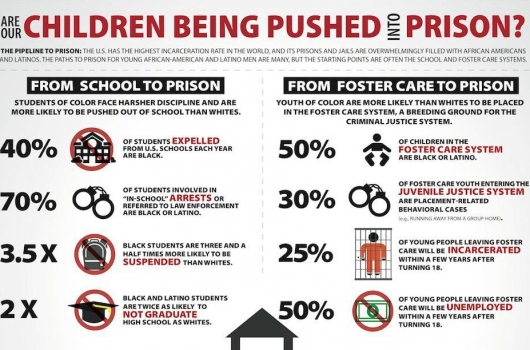Dismantling the School-to-Prison Pipeline
 Infographic: suspensionstories.com, via PBS
Infographic: suspensionstories.com, via PBS
We have named it “the school-to-prison pipeline.” It’s emerged over the years. What we have discovered is that the pathway to prison is paved early on in one’s life, and that a disproportionate number of young people of color are subtly directed along this route. It is unnecessary, unjustified, and unconscionable. But it is a reality.
With the imposition of zero-tolerance policies in schools, more and more young people are referred to the court system for the adjudication of their cases. Schools send them to juvenile court, and juvenile courts place them in detention facilities. These young people are then stigmatized and labeled. And often prison is where they find themselves at young ages.
It doesn’t have to be that way. There are other approaches and other solutions. Early intervention and alternative methods of resolution and disposition of these cases are producing much more favorable outcomes. More sound and reasonable approaches need to be implemented if we have any hope to dismantle this insidious and destructive pipeline to prison.
Healthy and Positive Alternatives
It could have ended in another American tragedy. All the elements were there. Three 11-year-old, African-American boys were outside a Burger King restaurant in Louisville, Kentucky. A bystander observed what he thought was a handgun in the waistband of one of the boy’s pants. The police were called. When they arrived, the boys took off running. As he chased the boys, one officer saw them pitch the handguns. The boys were stopped and ordered to drop to the ground. Arrests were made, and the doors to the prison pipeline slowly began to open.
But…the handguns turned out to be BB guns that looked like handguns. Fortunately for these boys, the police officers who responded were well trained and used good judgment. The boys had purchased these cheap BB guns at a flea market, and they got lucky. Not only were the police officers responsible, but they also were familiar with Louisville’s restorative justice program for juveniles.
The restorative justice movement is growing because it offers a healthy and positive alternative. It brings together the victim, the offender, and community members. A conference is held. Parties meet. Questions are asked. Explanations are given. Forgiveness is sought. Reconciliation occurs. Solutions are reached that hold the offender accountable and provide the victim a place to voice concerns. Community members help fashion a resolution to which all parties agree. And young people avoid the perils of a retributive justice system where the road to prison and a life of crime may begin.
The three boys and their mothers met with the two arresting officers along with two trained community members who served as facilitators. Ground rules were reviewed, and then everyone was invited to speak. The boys explained what happened. The police officers gave their version. The boys’ mothers shared their thoughts. The dialogue was healthy. The police officers spoke of their concerns—the possible dangers and the implications of what the boys had done. The boys apologized.
Restorative Justice Works
It was agreed that the boys would contact one of the police officers and they would all meet with the manager of the Burger King to apologize. Each boy would do 15 hours of community service within 90 days. Everyone signed off on the agreed-upon plan.
Instead of a protracted criminal process with days off work for their mothers and out of school for them, a reasonable solution was reached. And perhaps the best part was the conversation between the police officers and the boys as we were leaving the conference. They agreed to go out and celebrate together when the boys completed their community service.
Restorative justice works. We need to learn more about it and to introduce it to more of our communities. Join The Rev. Dr. Dietra Wise Baker and me for a webinar on Thursday, March 17th, at 1:00 CST / 2:00 EST, where you will learn more about the school-to-prison pipeline and ways you and your faith community can become part of emerging solutions, including those that employ the principles of restorative justice. I would love to learn of your experience with restorative justice practices.
Rev. Dean Bucalos serves as part-time Mission Specialist for NBA Prison and Jail Ministries. Connect with Dean by email at prisonministries@nbacares.org.